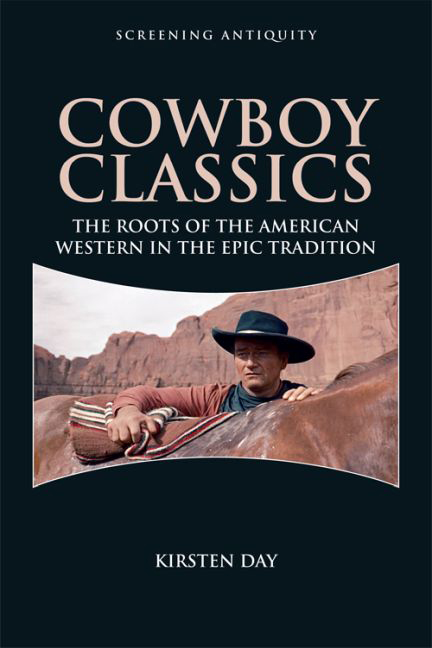Book contents
- Frontmatter
- Contents
- Series Editors’ Preface
- Acknowledgments
- Illustrations
- Prologue
- Introduction: Western Film and the Epic Tradition
- 1 Howard Hawks's Red River
- 2 Fred Zinnemann's High Noon
- 3 George Stevens's Shane
- 4 John Ford's The Searchers
- 5 John Ford's The Man Who Shot Liberty Valance
- Conclusion
- Bibliography
- Filmography
- Index
Introduction: Western Film and the Epic Tradition
Published online by Cambridge University Press: 23 September 2017
- Frontmatter
- Contents
- Series Editors’ Preface
- Acknowledgments
- Illustrations
- Prologue
- Introduction: Western Film and the Epic Tradition
- 1 Howard Hawks's Red River
- 2 Fred Zinnemann's High Noon
- 3 George Stevens's Shane
- 4 John Ford's The Searchers
- 5 John Ford's The Man Who Shot Liberty Valance
- Conclusion
- Bibliography
- Filmography
- Index
Summary
In the American psyche, the “Wild West” is a mythic-historical place where the nation's values and ideologies were formed. In this violent and uncertain world, the cowboy is the ultimate hero, fighting the bad guys, forging notions of manhood, and delineating what constitutes honor as he works to build civilization out of wilderness. Tales from this mythical place are best known from that most American of media: film. In the Greco-Roman societies that form the foundation of Western civilization, similar narratives were presented in what for them was the most characteristic, and indeed most filmic, genre: epic. Like Western films, the canonical epics of classical antiquity focus on the legendary past and its warriors who worked to establish the ideological framework of their respective civilizations. These parallel cultural roles result in surprising connections between these seemingly disparate yet closely related genres.
Cowboy Classics looks at these broader generic connections and the reasons behind them through examination of some of the best examples of each: the works of Homer and Virgil – undisputed titans of Greco-Roman literature whose epics assumed near-biblical status in their own societies and are still revered as foundational masterworks of Western civilization – and five films from the Golden Age of Westerns1 that have attained canonical status both through their critical and commercial success and through the influence they have exerted not just on later film productions in various genres, but as important components of cultural literacy in America as well. Even those who have not seen these films – or indeed, any Western movies at all – equate John Wayne with the powerful, charismatic, and intractable epitome of the Western hero as Hawks first presented him in Red River (1948); everyone “knows” that showdowns happen at High Noon (1952); for many, the cry “Shane! Come back!” (Shane, 1953) evokes nostalgia for lost heroes, and the exhortation to “Print the legend” (The Man Who Shot Liberty Valance, 1962) touches on the complicated relationship between myth, history, and America's national self-image; and moviegoers of all stripes recognize as important cinematic motifs the hero's return to a homestead burned and a family massacred, the obstinate, world-weary associations of the catch-phrase “That'll be the day,” and the isolated hero framed in a doorway, even if they have never heard of John Ford's The Searchers (1956).
- Type
- Chapter
- Information
- Cowboy ClassicsThe Roots of the American Western in the Epic Tradition, pp. 11 - 35Publisher: Edinburgh University PressPrint publication year: 2016



